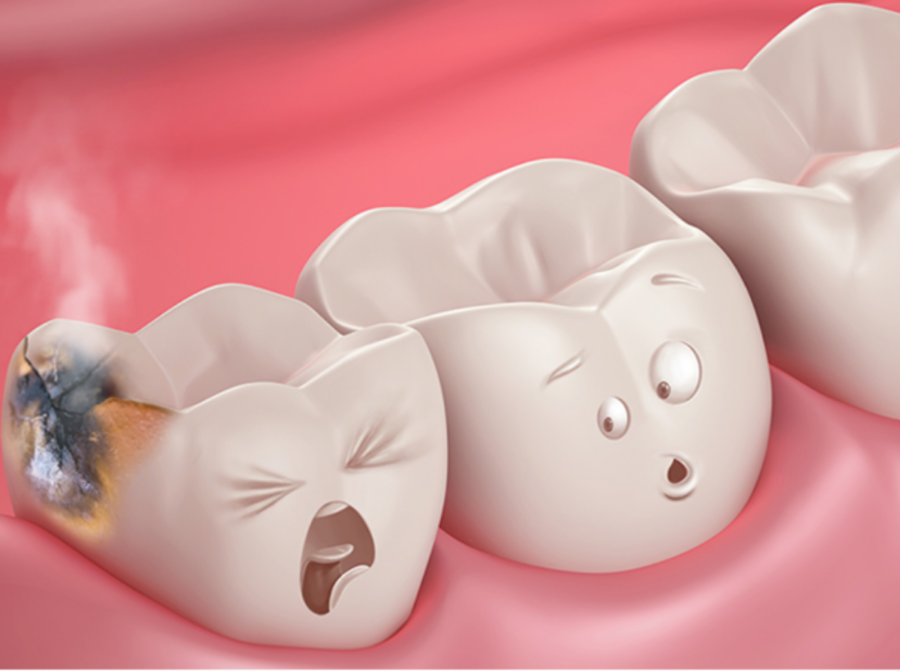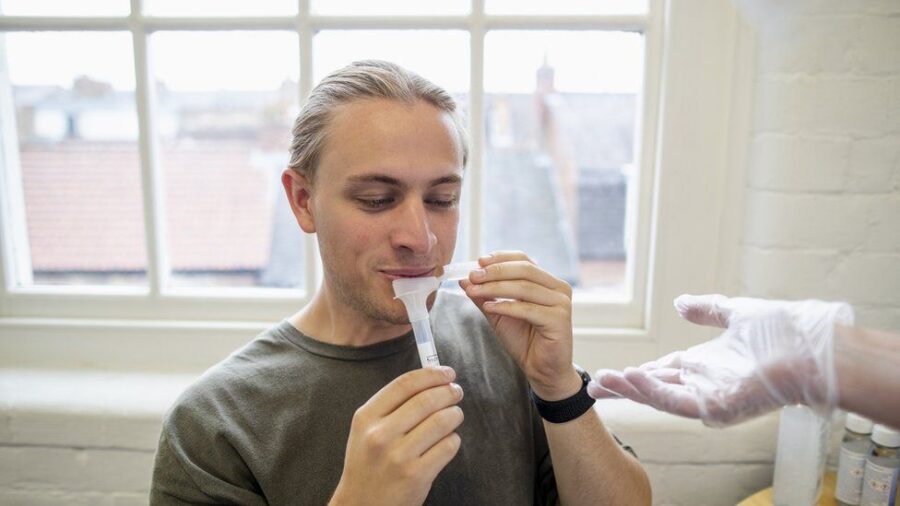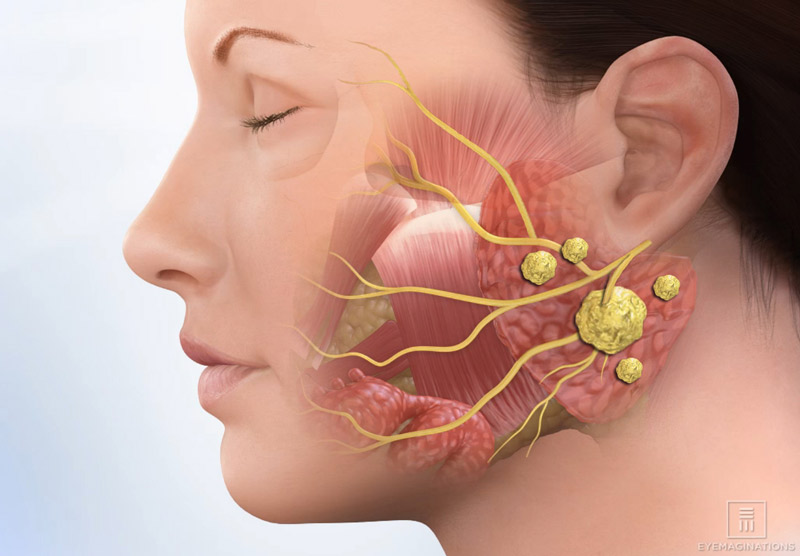Welcome to the Royal Dental Clinic blog, where we strive to provide you with the latest information on maintaining optimal oral health. In today’s article, we will delve into an often overlooked yet essential component of oral health: saliva. As a dentist, Dr. Chirag Chamria recognizes the importance of saliva in preserving a healthy smile. Join us as we explore the fascinating role that saliva plays in maintaining oral health.
Nature’s Protective Mechanism
Saliva is a clear liquid secreted by the salivary glands present in our mouths. It might appear insignificant, but its functions go far beyond just lubricating the oral cavity. Saliva acts as a natural protective mechanism that plays a vital role in maintaining oral health.
When we consume food, saliva aids in the initial breakdown of carbohydrates through the enzyme amylase, initiating the process of digestion even before the food reaches the stomach. Additionally, saliva contains proteins and minerals that help to neutralize acid, preventing tooth decay and enamel erosion.
How Saliva Helps Prevent Tooth Decay
One of the most important functions of saliva is its role in preventing tooth decay. Saliva helps to protect teeth by neutralizing acids in the mouth that can erode tooth enamel and cause cavities. This is because saliva contains bicarbonate, which helps to neutralize acids produced by bacteria in the mouth. It also helps to remineralize teeth by providing essential minerals such as calcium and phosphate. These minerals help to strengthen tooth enamel and repair any damage that may have occurred.

Another way that saliva helps to prevent tooth decay is by washing away food particles and bacteria that can accumulate on the teeth and gums. It contains enzymes that break down food and help to remove debris from the mouth, reducing the risk of plaque buildup and gum disease.
Moisturising and Cleansing the Oral Cavity
Saliva is responsible for keeping our mouths moist, which in turn promotes proper speech, swallowing, and overall comfort. Dry mouth, known as xerostomia, can lead to difficulties in speaking, chewing, and swallowing, as well as an increased risk of oral infections.
Moreover, saliva acts as a natural cleanser, washing away food particles, debris, and bacteria from the teeth, gums, and tongue. It helps to maintain oral hygiene and reduce the risk of dental plaque and gum disease. Insufficient saliva production can compromise these cleansing functions, leading to an increased likelihood of oral health problems.
Antibacterial and Antifungal Properties
Did you know that saliva possesses antibacterial and antifungal properties? Saliva contains enzymes and antibodies that can combat harmful bacteria and prevent them from multiplying. These antimicrobial properties contribute significantly to the prevention of oral infections and the overall maintenance of oral health.
Furthermore, it contains immunoglobulins, such as secretory IgA, which help to boost the body’s immune response and protect against common oral pathogens. This highlights the crucial role it plays in defending our oral cavity against harmful invaders.
Saliva’s Contribution to Digestion and Swallowing
In addition to its role in oral health, saliva also plays a crucial role in digestion and swallowing. Saliva contains enzymes such as amylase and lipase, which help to break down food and aid in digestion.
It also helps to moisten food and make it easier to swallow. Without saliva, it would be difficult to swallow food and maintain a healthy digestive system.
Buffering and Remineralization of Teeth
Acidic foods, beverages, and even bacteria in our mouths can lower the pH levels, creating an acidic environment that promotes tooth decay. However, saliva acts as a buffer, helping to neutralize and regulate the pH balance in the mouth, preventing the demineralization of tooth enamel.
Additionally, it aids in the remineralization of teeth. It supplies essential minerals, such as calcium and phosphate, which are crucial for repairing damaged tooth enamel and strengthening teeth. This remineralization process can reverse the early stages of tooth decay and prevent the progression of cavities.
Healing and Tissue Repair
Saliva contains growth factors and other substances that promote tissue healing and repair. It aids in the regeneration of oral tissues, such as the gums and mucosa, enhancing their resilience and ability to combat infection. It also assists in the production of collagen, which is essential for maintaining healthy gums and supporting the underlying bone structure.

Saliva as a Diagnostic Tool
Beyond its protective functions, saliva can serve as a valuable diagnostic tool in dentistry. Analysis of saliva can provide insights into an individual’s oral and overall health status. It can help identify markers for various diseases, such as oral cancer, diabetes, and autoimmune disorders. It’s testing allows for early detection and intervention, leading to better treatment outcomes and improved patient care.
Impact of Certain Medications on Saliva Production
Certain medications can have an impact on it’s production, leading to a condition known as dry mouth syndrome. Dry mouth syndrome occurs when there is a decrease in the production of saliva, leading to a range of oral health problems.

Some medications that can cause dry mouth syndrome include antidepressants, antihistamines, and diuretics. These medications can interfere with the production of it, leading to a range of symptoms such as difficulty swallowing, a dry or sticky feeling in the mouth, and an increased risk of cavities and gum disease.
It is important to talk to your dentist if you are experiencing symptoms of dry mouth syndrome, as they can recommend treatments such as saliva substitutes or medications to increase it’s production.
Tips for Maintaining Healthy Saliva Production
Stay hydrated: Drinking plenty of water can help to keep your mouth moist and promote healthy saliva production.
Chew sugar-free gum: Chewing gum can help to stimulate it’s production and promote good oral health. Look for sugar-free gum to avoid the risk of cavities.
Avoid alcohol and tobacco: Alcohol and tobacco can both have a drying effect on the mouth, leading to a decrease in it’s production.
Talk to your doctor: If you are taking medications that may affect it’s production, talk to your doctor about possible alternatives.
Conclusion
Saliva is a remarkable substance that plays a multifaceted role in maintaining oral health. From its digestive properties and antibacterial functions to its role in buffering, remineralization, and tissue repair, it is a vital component of a healthy oral ecosystem. As we’ve explored, understanding the importance of it emphasizes the need for regular dental care and practices that promote it’s production. By nurturing our saliva’s natural abilities, we can enhance our oral health, safeguard our smiles, and enjoy a lifetime of healthy teeth and gums. Remember, the next time you think about oral health, don’t forget to appreciate the invaluable role of saliva.
© All rights reserved by Royal Dental Implants Pvt Ltd
Issued in public interest






